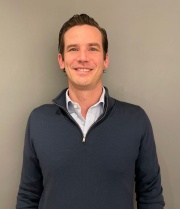Jordan McNiven
MDE 2010

I’ll confess my early career felt more like an aimless wander rather than a linear path to professionalism. Prior to Dal I’d worked 2 years in marketing and post-masters I landed with the Federal Government at Natural Resources Canada. Admittedly, natural resources wasn’t an area of interest (resource economics was one of the only courses I didn’t take during my masters) but I needed a job and after completely tanking interviews with Finance Canada, there I was. However, what I learned was things like trade and economic growth, which I have a genuine interest in, are deeply intertwined in energy. I also learned, after 3 years, that the government wasn’t a great fit for me.
At this point I was pretty lost. I was about to turn 30 and felt like my career had gone nowhere. And then everything changed. At work I received copies of some equity research reports, I found them really interesting and thought I’d like to give that a try. It was a whole new path and it has led me on an unimaginable journey. I spent 8 years in equity research before switching over to the investment side of the industry with Wellington Management in London where I help manage a $1B energy fund.
I enjoy breaking down companies, figuring out their competitive positioning and, ultimately, how much they are worth. I think my investment style is very much a reflection of my education. I’m a top-down investor, my process starts with trying to figure out the macro drivers of a company, or industry, and where constraints may exist; identifying a constraint in an industry is often an investment opportunity. Additionally, economics teaches you to track how a shock in one place reverberates through an entire system. This has suited me very well as an investor in the energy transition where the whole system is effectively being shocked and all forms of energy are imperfect substitutes for each other. More generally, I think one of the most important traits in the investment world is creativity; being able to look at the same data as everyone else and find a different conclusion. When I look around, a lot of our most successful investors are economics grads and I believe this is because, more than anything, economics teaches you to think, and think differently.
It's been an unconventional career path and certainly not one I could have predicted. When people ask how I got here, I typically say ‚Äúby accident‚ÄĚ. It was never my plan to work in energy or finance but, as I got exposure to new things, I kept letting my interests guide me and it‚Äôs opened up opportunities I never could have imagined.
For my next chapter, whenever that comes, I’d like to teach economics or finance, I think it would be a fitting way to finish my career. But if I’ve learned anything along my journey it’s that things won’t turn out as expected… and that’s ok!
